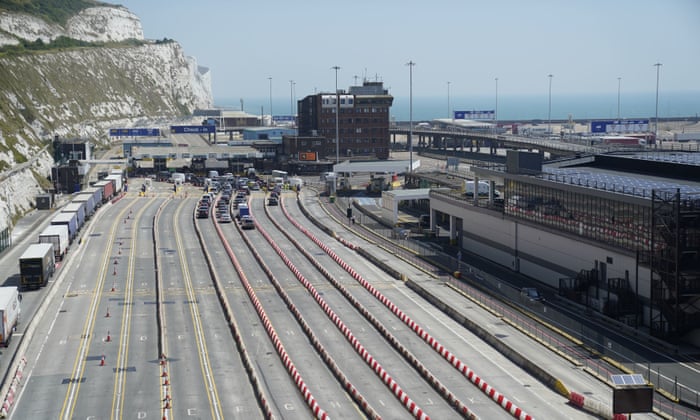[ad_1]
Introduction: Ryanair signals risk of new Covid variants
Good morning, and welcome to our rolling coverage of business, the world economy and the financial markets.
Budget airline Ryanair has warned that the recovery in air travel is “very strong but still fragile,” as a jump in passenger numbers helped it return to profit.
Ryanair posted a pre-tax profit of €203m for April-June this morning, its first profit for this quarter since the Covid-19 pandemic began.
But chief executive Michael O’Leary has signalled that the autumn could bring fresh disruption, if new variants of the virus emerge.
O’Leary told shareholders this morning it was too soon to provide a meaningful profit guidance for the current financial year, given the uncertainty:
While we remain hopeful that the high rate of vaccinations in Europe will allow the airline and tourism industry to fully recover and finally put Covid behind us, we cannot ignore the risk of new Covid variants in Autumn 2022.
Our experience with Omicron last November, and the Ukraine invasion in February, shows how fragile the air travel market remains, and the strength of any recovery will be hugely dependent upon there being no adverse or unexpected developments over the remainder of FY23.
Several variants of the fast-spreading Omicron strain of Covid-19 have already been detected this year, leading to an increase in cases and hospitalisations in some countries.
Ryanair’s Q1 profit was a recovery on a €324.5m pre-tax loss a year ago, lifted by a strong recovery in traffic. Passenger numbers rose to 45.5m in the quarter, up from 8.1m in 2021 when travel restrictions were in place, and 9% more than pre-Covid.
But Easter bookings and fares were “badly damaged” by the Russian invasion of Ukraine in February, the airline adds, pushing average fares 4% below pre-Covid levels.
O’Leary says there are “clear signs” of pent-up demand, but people are bookings flights closer to their travel day than they did before Covid.
Striking a cautious note, O’Leary says this ‘later booking profile’, plus the lack of visibility over the outlook, volatile oil prices, and “potential Covid, geopolitical and supply chain” make it difficult to forecasting earnings this year.
We hope to be in a better position to do so at the half year results in November, but, as our experience with Omicron last November and Ukraine in February shows, any guidance is subject to a very rapid change from unexpected events which are well beyond our control during what remains a very strong but still fragile recovery.”
Also coming up today
Drivers face the risk of further delays as the summer getaway continues.
Port officials at Dover said yesterday that services were finally back to normal, following days of chaos and very lengthy queues.

Border and ferry staff worked “through the night” to clear the huge volumes of tourist and freight traffic, after a “critical incident” was declared last week.
The situation got back to normal by the early hours of Sunday morning, a port spokesman said, but drivers could face another busy day crossing the Channel.
Queues of traffic are building again at the Port of Dover with predictions of another busy day for people trying to cross the Channel. Congestion at the Eurotunnel at Folkestone has eased. We’ll speak to @_NatalieChapman @LogisticsUKNews#bbcgms 0740
— Gary Robertson (@BBCGaryR) July 25, 2022
The AA has warned that Folkestone has replaced Dover as Britain’s ‘hotspot of holiday hell’, as holidaymakers try to negotiate jams in the area and reach the Eurotunnel terminal.
After gains last week, the UK’s FTSE 100 index is set to open around 0.4% lower as economic slowdown worries continue to weigh on markets.
Last week global equities enjoyed upbeat sessions. Markets had looked over-sold. Inflation & mixed earnings remain a concern. Profit taking in evidence early doors. Oil $102. Asia tepid. Suggested opening calls: FTSE -30 @ 7246 DAX -82 @ 13171 CAC40 -32 @ 6184 DJIA -27 @ 13871
— David Buik (@truemagic68) July 25, 2022
On the economic front, the CBI’s latest healthcheck on UK factories is released this morning, alongside German business confidence data and a survey of economic activity in the US.
Hundreds of dockworkers at one of Britain’s largest container ports in Liverpool will be balloted for strike action, in a dispute over pay and conditions.
The Unite union said last week that more than 500 dockworkers at MDHC Container Services, part of Peel Ports, in Liverpool would be asked to vote over industrial action after a 7% pay offer was deemed inadequate and workers were not given an agreed bonus.
“The Unite union said more than 500 dockworkers at MDHC Container Services, part of Peel Ports, in Liverpool would be asked to vote over industrial action after a 7% pay offer was deemed inadequate and workers were not given an agreed bonus.”https://t.co/m5NIZ4EEiU
— OL USA (@OLOGUSA) July 19, 2022
The agenda
- 9am BST: IFO survey of German business climate
- 11am BST: CBI’s industrial trends report into UK manufacturing
- 1.30pm BST: Chicago Fed National Activity Index
Key events
Filters BETA
UK restaurant insolvencies jump by more than 60%

Kalyeena Makortoff

Worker shortages and the cost of living crisis has forced more UK restaurants to shut their doors for good.
The number of restaurants falling into insolvency has increased by more than 60% in the past year, according to accountancy firm UHY Hacker Young.
It reports that 1,406 restaurants in the UK closed their doors in the 12 months to May, up 64% on the previous year.
Peter Kubik, a partner at UHY Hacker Young, says pressure on hospitality firms is intensifying.
“Restaurants that only just managed to survive the pandemic thanks to government support are now facing fresh challenges in the form of rising inflation, a post-Brexit labour shortage and consumers who simply cannot afford to spend as much.”
Here’s the full story:
That follows a number of high-profile restaurant businesses – including Byron, Gourmet Burger Kitchen and the Italian chains Strada and Carluccio’s – being forced to shut dozens of sites at the height of the pandemic as they incurred heavy financial losses during repeated lockdowns and other Covid restrictions.
Two in five airport workers ‘thinking of quitting’
More than two in five airport workers are considering quitting, research suggests, which could escalate delays already seen at terminals this year.
A survey of 1,700 workers by the UK jobs site CV-Library found reasons for wanting to leave the industry included wanting better pay and less stress.
Two out of three of those surveyed said they had not had a pay rise in the past 12 months, despite staff shortages that left airlines and airports scrambling to hire staff. More here:
Ryanair shares dip
Shares in Ryanair have dropped almost 1% in early trading, as traders digest Michael O’Leary’s warning that the recovery is ‘still fragile’.
Victoria Scholar, head of investment at interactive investor, points out that Ryanair’s shares are down around a third this year, due to a series of problems:
The industry is grappling with a series of headwinds from volatile fuel prices, the war in Ukraine, staff shortages and the spread of Covid-19. Unhappy passengers have been on the front pages this summer with strikes, cancellations and delays affecting the whole travel industry.
As a result, shares in Ryanair have struggled, shedding around 30% since the February high and the onset of war in Ukraine.”
Analysts are impressed with Ryanair’s performance as it returned to profit for the last quarter [the results are online here].
Stephen Furlong, analyst at Davy, says its operation, growth, cost and balance sheet are “best in class,” with after-tax profits of €170m beating forecasts.
Stockbrokers Goodbody described the release as “a very strong set of numbers”.
Citi said a Q1 cost outperformance and comments that fares are now ahead of pre-Covid levels were “likely to drive FY consensus upgrade.”
Aviation export Richard Schuurman has more details on Ryanair’s results:
.@Ryanair reports €170mln net profit for its Q1 of FY23, compared to €-272.6mln last year.
Operating profit €219.6mln versus €-304.5mln.
Total revenues €2.6bln compared to €370.5mln, but expenses up to €2.4bln from €681mln. Fuel costs soared to €1.0bln from €156.6mln.— Richard_on_aviation (@rschuur_aero) July 25, 2022
.@Ryanair says it has “limited visibility” into Q2, although fares are ahead of FY19. No guidance for FY23, but Ryanair is worried of new Covid variants coming autumn/winter.
It blames lower punctuality on unprecedented ATC delays, not on recent strikes.— Richard_on_aviation (@rschuur_aero) July 25, 2022
Ryanair also points out that the jump in fuel prices this year will push up its costs:
Despite being one of the best hedged airlines in Europe, high oil prices will lead to increased costs on our 20% unhedged fuel for the remainder of FY23.
It also blames a drop in customer satisfaction ratings on ongoing air traffic control delays, and the chaos at airport security this year.
Introduction: Ryanair signals risk of new Covid variants
Good morning, and welcome to our rolling coverage of business, the world economy and the financial markets.
Budget airline Ryanair has warned that the recovery in air travel is “very strong but still fragile,” as a jump in passenger numbers helped it return to profit.
Ryanair posted a pre-tax profit of €203m for April-June this morning, its first profit for this quarter since the Covid-19 pandemic began.
But chief executive Michael O’Leary has signalled that the autumn could bring fresh disruption, if new variants of the virus emerge.
O’Leary told shareholders this morning it was too soon to provide a meaningful profit guidance for the current financial year, given the uncertainty:
While we remain hopeful that the high rate of vaccinations in Europe will allow the airline and tourism industry to fully recover and finally put Covid behind us, we cannot ignore the risk of new Covid variants in Autumn 2022.
Our experience with Omicron last November, and the Ukraine invasion in February, shows how fragile the air travel market remains, and the strength of any recovery will be hugely dependent upon there being no adverse or unexpected developments over the remainder of FY23.
Several variants of the fast-spreading Omicron strain of Covid-19 have already been detected this year, leading to an increase in cases and hospitalisations in some countries.
Ryanair’s Q1 profit was a recovery on a €324.5m pre-tax loss a year ago, lifted by a strong recovery in traffic. Passenger numbers rose to 45.5m in the quarter, up from 8.1m in 2021 when travel restrictions were in place, and 9% more than pre-Covid.
But Easter bookings and fares were “badly damaged” by the Russian invasion of Ukraine in February, the airline adds, pushing average fares 4% below pre-Covid levels.
O’Leary says there are “clear signs” of pent-up demand, but people are bookings flights closer to their travel day than they did before Covid.
Striking a cautious note, O’Leary says this ‘later booking profile’, plus the lack of visibility over the outlook, volatile oil prices, and “potential Covid, geopolitical and supply chain” make it difficult to forecasting earnings this year.
We hope to be in a better position to do so at the half year results in November, but, as our experience with Omicron last November and Ukraine in February shows, any guidance is subject to a very rapid change from unexpected events which are well beyond our control during what remains a very strong but still fragile recovery.”
Also coming up today
Drivers face the risk of further delays as the summer getaway continues.
Port officials at Dover said yesterday that services were finally back to normal, following days of chaos and very lengthy queues.

Border and ferry staff worked “through the night” to clear the huge volumes of tourist and freight traffic, after a “critical incident” was declared last week.
The situation got back to normal by the early hours of Sunday morning, a port spokesman said, but drivers could face another busy day crossing the Channel.
Queues of traffic are building again at the Port of Dover with predictions of another busy day for people trying to cross the Channel. Congestion at the Eurotunnel at Folkestone has eased. We’ll speak to @_NatalieChapman @LogisticsUKNews#bbcgms 0740
— Gary Robertson (@BBCGaryR) July 25, 2022
The AA has warned that Folkestone has replaced Dover as Britain’s ‘hotspot of holiday hell’, as holidaymakers try to negotiate jams in the area and reach the Eurotunnel terminal.
After gains last week, the UK’s FTSE 100 index is set to open around 0.4% lower as economic slowdown worries continue to weigh on markets.
Last week global equities enjoyed upbeat sessions. Markets had looked over-sold. Inflation & mixed earnings remain a concern. Profit taking in evidence early doors. Oil $102. Asia tepid. Suggested opening calls: FTSE -30 @ 7246 DAX -82 @ 13171 CAC40 -32 @ 6184 DJIA -27 @ 13871
— David Buik (@truemagic68) July 25, 2022
On the economic front, the CBI’s latest healthcheck on UK factories is released this morning, alongside German business confidence data and a survey of economic activity in the US.
Hundreds of dockworkers at one of Britain’s largest container ports in Liverpool will be balloted for strike action, in a dispute over pay and conditions.
The Unite union said last week that more than 500 dockworkers at MDHC Container Services, part of Peel Ports, in Liverpool would be asked to vote over industrial action after a 7% pay offer was deemed inadequate and workers were not given an agreed bonus.
“The Unite union said more than 500 dockworkers at MDHC Container Services, part of Peel Ports, in Liverpool would be asked to vote over industrial action after a 7% pay offer was deemed inadequate and workers were not given an agreed bonus.”https://t.co/m5NIZ4EEiU
— OL USA (@OLOGUSA) July 19, 2022
The agenda
- 9am BST: IFO survey of German business climate
- 11am BST: CBI’s industrial trends report into UK manufacturing
- 1.30pm BST: Chicago Fed National Activity Index
[ad_2]
Source link



